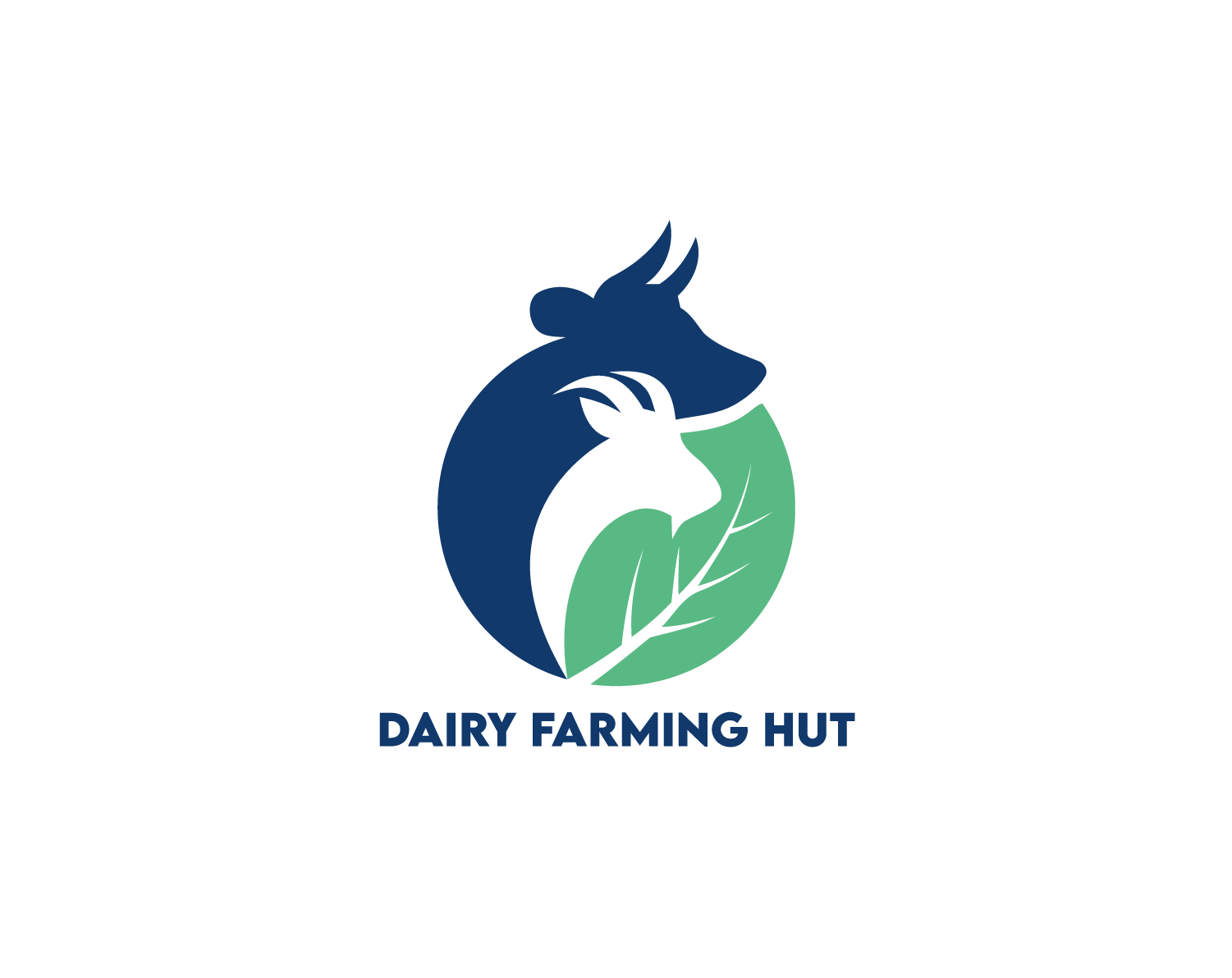Starting up a dairy farm – even a small-to-medium-sized dairy farm is an expensive process. Just how much do you need to have tucked away to get your farm started? We have broken it down for you.
Decide What Type Of Dairy Farm You Will Have
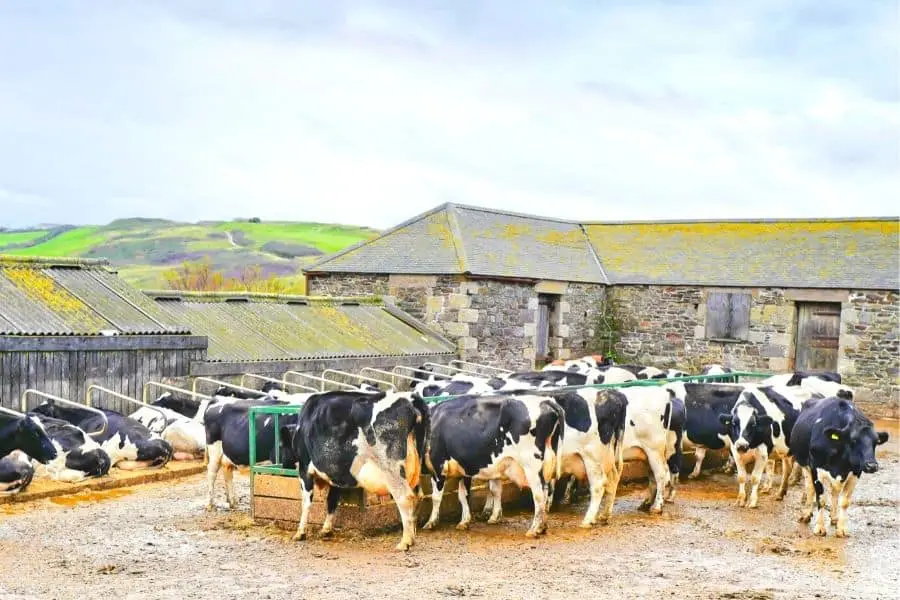
So, you have decided that you want to start a dairy farm. The first big question to ask yourself is what type of dairy farm do you want? The cost of setup will vary depending on the animals you will keep.
The three most common animals for a dairy farm are cows, goats, or sheep, and there are pros and cons to each.
A Cow Dairy Farm
The more traditional option for dairy farms, cows, may seem like the best option for your dairy, but first, consider these pros and cons.
Pros
Cons
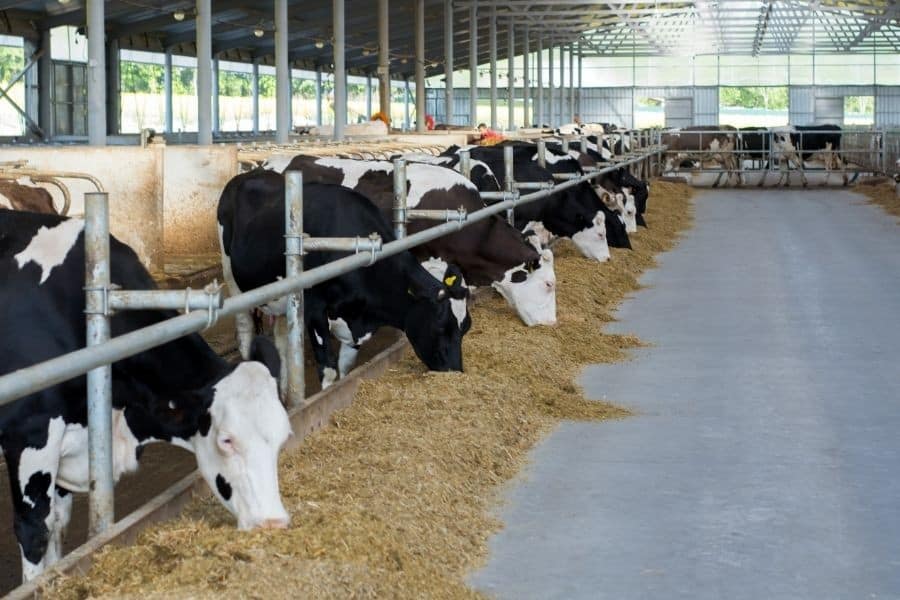
Our Opinion
Consider keeping cows if you are an experienced farmer or if you are comfortable working with large livestock. Cows are also a good option if you plan on producing larger quantities of dairy products.
A Goat Dairy Farm
While goat milk is the most commonly consumed milk globally, goats are less intimidating to new farmers. There are some things to consider when starting up a goat dairy.
Pros
Cons
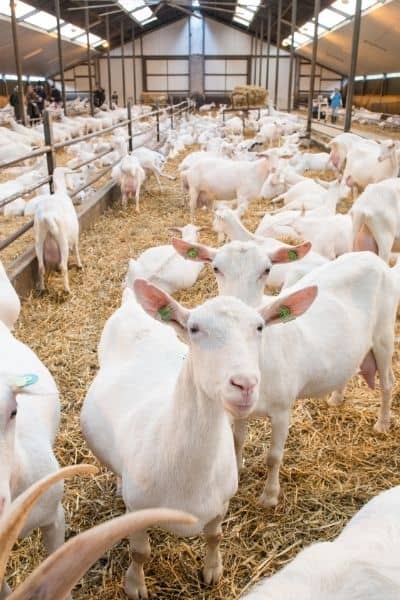
Our Opinion
Goat dairy farms are becoming more popular because of the potential of profitability (which is a great reason for keeping your own goats!) Goats are also very hardy animals, something that is very beneficial to you as a dairy owner. Lastly, goats are a good option if you are uncomfortable working with large livestock or do not have space on your farm for a small herd of cows.
A Sheep Dairy Farm
A sheep dairy farm is perhaps the least well-known of the dairy farms we mentioned above.
Pros
Cons
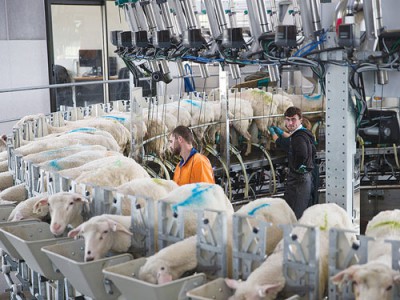
Our Opinion
If you find the idea of smaller dairy animals more appealing, sheep are easier to manage than goats. Sheep work together as a herd. Unlike sheep, goats go where they want to go when they want to go, which makes corralling difficult!
Although sheep milk is not in very high demand in the U.S., you can supplement your income by selling wool.
Consider starting a sheep dairy if you want a smaller dairy animal and goats are a little too mischievous for you!
Consider keeping goats if you are looking for fun and interactive animals as well as milk producers.
Expect to pay between $200 to $250 per head for the average milk-producing sheep.
How Much Land is Required For Each Type of Dairy Farm
The next step in starting your dairy farm is to estimate the amount of space needed. As we mentioned before, this will vary depending on what type of animal you will be keeping.
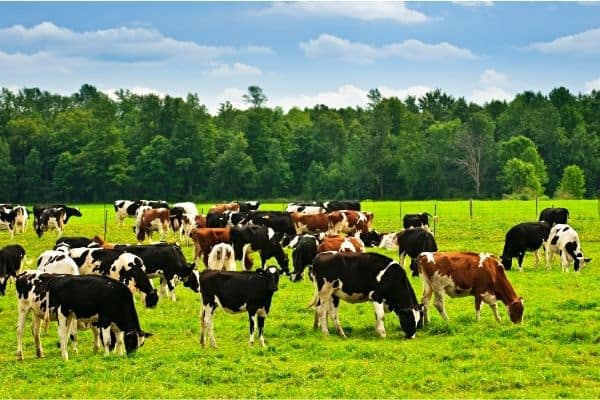
A Cow Dairy
Plan on needing between 1.5 to 2 acres of land per cow for grazing and additional acreage for your farming facilities – assume 10 acres.
For a 20-cow dairy, you are looking at 50 acres of land.
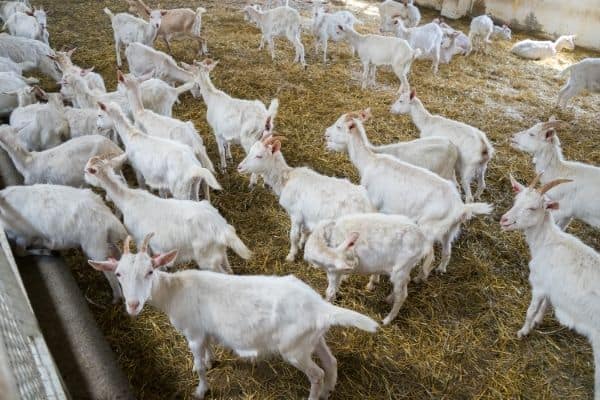
A Goat Dairy
Plan on needing approximately half an acre per goat. Plan on another 10 acres for your farming facilities.
For a herd of at least 3 to 5 does and 1 to 2 bucks, you need at least 15 acres of land.
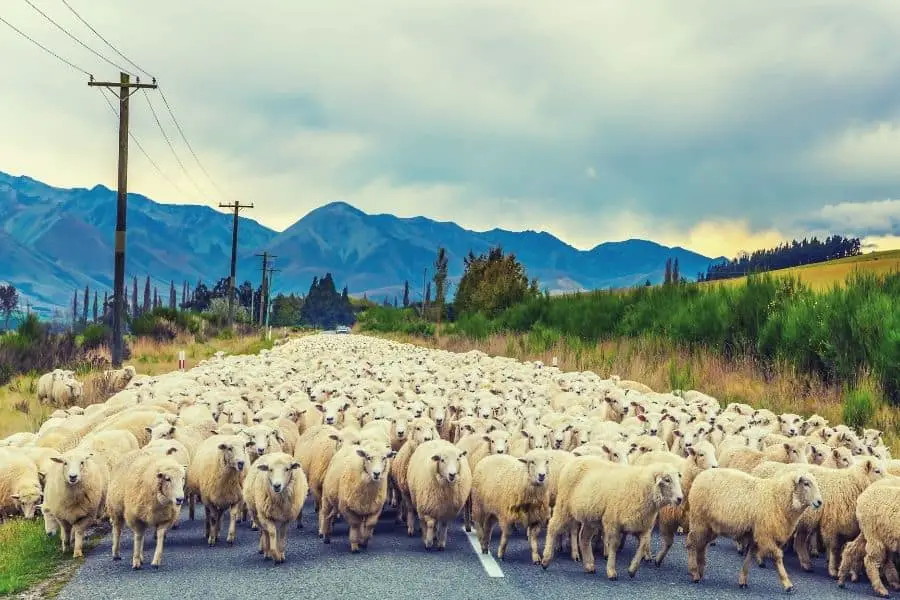
A Sheep Dairy
Plan on needing approximately half an acre per sheep. Again, plan on another 10 acres for your farming facilities.
For a herd of 5 ewes and one ram, you need at least 15 acres of land.
The Cost of Land
According to the USDA, in 2020, the average cost of farmland in the U.S. was $3,160 per acre.
How Much Does It Cost To Feed And Maintain Dairy Animals
In addition to the cost of your farmland and your animals, you must consider the cost per head to feed and maintain your animals. This cost includes vaccinations and routine veterinary care.
Dairy Cows
Dairy cows will cost around $1,000 per head per year for their care and feed.
Dairy Goats
The average cost of a doe per year is $1,024 for care and feed.
Dairy Sheep
The average cost of a sheep is $1,000 per ewe per year for care and feed.
What Equipment Do You Need? Will You Rent Or Buy?
There will be a difference in the specific equipment needed to start up your dairy, depending on whether you have a cow, goat, or sheep dairy. Those differences aside, you can expect to spend a bare minimum of $150,000 on the machinery and equipment needed for a small dairy.
The list of common equipment and machinery include:
check out
Our Buyers Guides
Our top picks for your Dairy Farming Needs
Monthly Operating Costs
In addition to your significant startup expenses like machinery, you also need to prepare for monthly operating costs.
Plan to have a bare minimum of three months of overhead costs on hand when starting your dairy.
Monthly operating costs include things like:
According to Profitable Venture, this average operational cost per month is around $20,000. So, you should have at least $60,000 set aside.
Keep in mind that your monthly operating costs will vary depending on the size of your farm. For example, having more animals means needing more laborers, which means more overhead.
The Cost Of Naming, Licensing, And Insurance of Your Dairy Farm
Another significant expense to anticipate is the cost of naming, licensing, and insuring your business.
Naming means registering your business and obtaining an EIN so that you become a legal company in the U.S.
Your EIN identifies your company to the government (state and federal,) and you will need it to file taxes, open company bank accounts, and file formal paperwork.
Registering your business and obtaining your EIN will cost around $750.
Licensing fees for your farm will cost somewhere around $15,300. This fee includes licenses, permits, and any legal fees involved in obtaining this documentation.
Your licensing fees allow you to conduct business within a specific jurisdiction. The amount you pay in licensing fees depends on where you live and the size and type of farm you plan to operate.
Expect to pay approximately $30,400 for your farm insurance policy. This policy should include:
Additional Expenses
In the sections above, we covered some of the significant expenses involved with starting up your dairy. These fees do not cover all the costs that you can expect to pay, however other considerations may include:
So How Much Do You Need To Set Aside To Start Your Dairy?
As we have mentioned a few times, the total amount you need to stash to start your dairy varies. This cost is affected by the animals , the size of herd, location of your farm, and the type of equipment you purchase.
Let us look at a few examples to put things into perspective.
Estimated Cost For A Medium-Sized Cow Dairy On Leased Land
A medium-sized dairy has between 30 and 200 cows.
- Cattle feed ($2,120 per head annually) and cattle medication costs ($126 per head annually) – $258,290.
- 3 months of operational costs – $60,000.
- Other start-up expenses (phone and utility deposits etc.) - $7,000.
- Construction of a farm facility with fencing – $300,000.
- Leasing farmland – $200,000
- Insurance coverage at a total premium – $30,400.
Business consultant fees to develop a business plan– $2,500. - Marketing expenses for the grand opening - $3,580.
- Obtaining licenses and permits (including necessary software for payroll etc.) – $15,300.
- Business registration fee – $750.
- Cost of the first set of cattle – $150,000.
- Cost of equipment/machines - $150,000.
- The cost for store equipment to have your own on-site store – $13,750.
- Purchase and installation of CCTV/security system – $5,000.
- Building / hosting a website – $600.
- Grand opening event – $8,000.
- Miscellaneous expenses – $5,000.
Source: ProfitableVenture
That is an estimated $1,210,170.00 (one million, two hundred and ten thousand, one hundred and seventy dollars) to set up a medium-scale dairy farm business in the U.S.
Estimated Cost For A Medium-Sized Goat Dairy
A medium-sized goat farm is a goat farm with between 100 and 300 goats.
- Goat feed ($240 per head per year) and vet care costs ($240 per head per year) – $96,000.
- 3 months of operational costs – $64,646.
- Other start-up expenses (phone and utility deposits etc.) - $7,000.
- Construction of a farm facility with fencing – $300,000.
- Leasing farmland – $200,000
- Insurance coverage at a total premium – $30,400.
- Business consultant fees to develop a business plan– $2,500.
- Marketing expenses for the grand opening - $3,580.
- Obtaining licenses and permits (including necessary software for payroll etc.) – $15,300.
- Business registration fee – $750.
- Cost of the first set of goats – $120,000.
- Cost of equipment/machines - $150,000.
- The cost for store equipment to have your own on-site store – $13,750.
- Purchase and installation of CCTV/security system – $5,000.
- Building / hosting a website – $600.
- Grand opening event – $8,000.
- Miscellaneous expenses – $5,000.
That is an estimated $1,022,526.00 (one million, twenty-two thousand, five hundred and twenty-six dollars) to set up a medium-scale goat dairy farm business with 200-goats in the US.
Estimated Cost For A Medium-Sized Sheep Dairy
Like a goat dairy, a medium-sized sheep dairy farm is a farm with between 100 and 300 sheep.
- Sheep feed ($104 per head per year) and vet care costs including shearing ($15.85 per head per year) – $23,970.
- 3 months of operational costs – $64,646.
- Other start-up expenses (phone and utility deposits etc.) - $7,000.
- Construction of a farm facility with fencing – $300,000.
- Leasing farmland – $200,000.
- Insurance coverage at a total premium – $30,400.
- Business consultant fees to develop a business plan– $2,500.
- Marketing expenses for the grand opening - $3,580.
- Obtaining licenses and permits (including necessary software for payroll etc.) – $15,300.
- Business registration fee – $750.
- Cost of the first set of sheep – $120,000.
- Cost of equipment/machines - $150,000.
- The cost for store equipment to have your own on-site store – $13,750.
- Purchase and installation of CCTV/security system – $5,000.
- Building / hosting a website – $600.
- Grand opening event – $8,000.
- Miscellaneous expenses – $5,000.
That is an estimated $950,496 (nine hundred and fifty thousand, four hundred and ninety-six dollars) to set up a medium-scale sheep dairy farm business with 200 sheep in the United States of America.
How Much Can You Earn By Selling Milk?
As a dairy farm owner, you undoubtedly plan to sell dairy products made from your animals’ milk. Let us look at how profitable that can be.
A Medium-Sized Cow Dairy Farm
The average dairy cow produces 7.4 gallons of milk a day, or around 229 gallons per month. Farmers get paid around $1.45 per gallon of milk although, it costs $2 per gallon to produce. This has led to a dairy farming crisis in which many dairy farms are forced to close their doors.
Cow dairy farmers make around $1.64 per pound of cheddar cheese, so many farmers are exploring the possibility of processing alternative products with their milk to make a higher profit.
A Medium-Sized Goat Dairy Farm
The average dairy goat produces 7.4 gallons of milk a day, or around 25.73 gallons per month. Farmers get paid around $12 per gallon of milk, guaranteeing the farmer a much higher profit. This has led to a rapid increase in the number of goat dairies opening more recently.
Goat dairy farmers can also sell goat cheese for around $14.95 per pound, so it isn’t surprising that the goat dairy industry is booming!
A Medium-Sized Sheep Dairy Farm
The average dairy sheep produces 2 gallons of milk a day, or around 63.69 gallons per month. Farmers can make $30 per gallon of milk.
While sheep farming has increased as cow’s milk becomes less profitable, making a living off sheep milk products requires a particularly large flock.
Sheep dairy farmers can sell sheep milk cheese for approximately $20-$30 per pound, which is an incredible profit.
What Kind Of Dairy Farm Is Right For You?
As you look over the information in this article and decide what type of dairy interests you, remember that there is more than just a financial side of things to consider.
Of course, profit is necessary to run a successful dairy. Keep in mind the amount of time and dedication the dairy business requires, and ask yourself if you are really ready for such a significant undertaking.
Also, consider the patience required to nurture a dairy farm business and overcome unexpected bumps in the road. When you work with animals, ensure the welfare of your animals as only healthy animals can produce better and bring steady income for you.
This is not an Investment Advice
The Ideas and Strategies presented on this website and the information are based on our research and experience. These strategies are not intended to be a source of financial or business advice concerning the material presented. The information and/or documents contained on this website do not constitute investment advice. Any business idea or investment plan with financial risk should never be used without first assessing your own personal and financial situation or consulting a financial professional.
